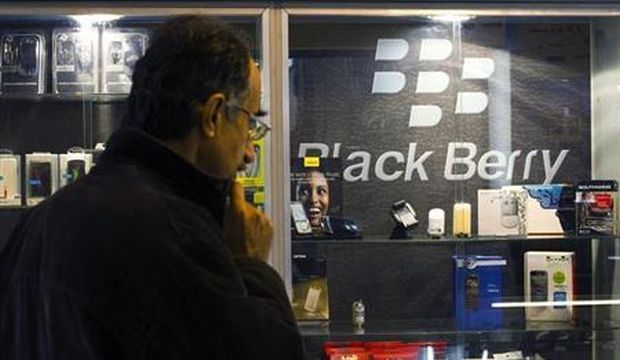
A man looks at a BlackBerry product display in a shop at a mobile and computer shopping complex in northern Tehran, Iran, on January 18, 2011. (Reuters/Raheb Homavandi)
London, Asharq Al-Awsat—A political showdown between Iran’s President Hassan Rouhani and his conservative opponents is brewing over plans to renew licenses and expand the country’s 3G cellular phone network, in a development that could have a massive impact on the country’s telecommunications sector.
Iran’s Minister of Communication Mahmoud Vaezi faced a new wave of political pressure against the government’s plan to roll out a 3G network and grant licenses to private sector firms over the weekend, after criticism from political and religious figures. On the sideline of a working meeting with his Qatari counterpart Hessa Al Jaber in Tehran on Saturday, Vaezi was repeatedly asked by reporters about the fate of 3G and 4G technology, which provides much faster data transmission via cellular phone networks.
A number of MPs and a leading Shi’ite cleric, Ayatollah Makarem Shirazi, condemned the Iranian Communication Ministry’s plans to roll out faster cellular networks and make them available for more users. Iranian media reported on Friday that Ayatollah Shirazi had issued a fatwa banning any attempts “to expand the speed and multimedia capability of mobile networks,” which he said was against “religion, morality and humanity.”
Nasrollah Pejman, a radical MP associated with the conservative Resistance Front, warned: “If the minister continues to go ahead with increasing bandwidth and Internet speed, then we will push for his impeachment and removal from the cabinet.”
“We will vigorously prevent all attempts by the [communication] minister to expand 3G technology, and if our warnings are not heeded, then the necessary course of action will be taken,” he added.
The fierce opposition by radical elements against providing faster Internet services is in line with previous efforts to prevent the increasingly tech-savvy Iranian public from using high-speed Internet. Iranians’ use of social media platforms like Facebook and Twitter during the 2009 unrest over alleged election fraud led to a widespread cyber-crackdown orchestrated by various organizations under the authority of Iranian Supreme Leader Grand Ayatollah Ali Khamenei.
According to Iran’s constitution, TV and radio broadcasting, as well as all telecommunications infrastructure, fall under government administration. TV and radio channels are supervised by officials appointed by the Supreme Leader, not the Iranian Presidency.
From the outset of his term, President Rouhani has vowed to secure better telecommunications services and relax online restrictions in Iran, charging Vaezi with pressing ahead to enhance the country’s ailing and stagnant telecommunications infrastructure inherited from previous administrations. He also maintains an official Twitter account, despite the fact that the service is blocked by Iran’s Internet censors.
In a recent speech, Rouhani complained about Iranian state TV and Radio’s coverage of his government and its policies, praising the Communication Ministry for offering “much-needed services” to the people. Rouhani views the Internet as the only medium through which his supporters can take popular stands against the constant attacks his administration faces from radicals seeking to frustrate his attempts to implement his policies.
The latest row follows the expiration of the existing 3G license, which was awarded to the company RighTel in 2012. Although the license was extended by one year, it excluded multimedia services. The government has now opened the bidding process to other operators.
In addition to the political backlash caused by this decision, Iran’s lucrative 3G market has the potential to embroil political and religious figures in a new round of confrontation while the bidders seek to secure the best deal for themselves. Even during Mohammad Khatami’s presidency, the development of a 2G network faced harsh criticism. Turkcell, a Turkish-based cellular operator, sought to invest in Iran’s huge and yet untapped telecommunications market, but claims it lost out in 2005 as the result of corrupt practices by a South African rival, MTN, which formed a joint consortium with the Iranian government.
MTN denies the allegations. A multi-billion dollar lawsuit launched by Turkcell in South Africa last November is currently before the courts.
